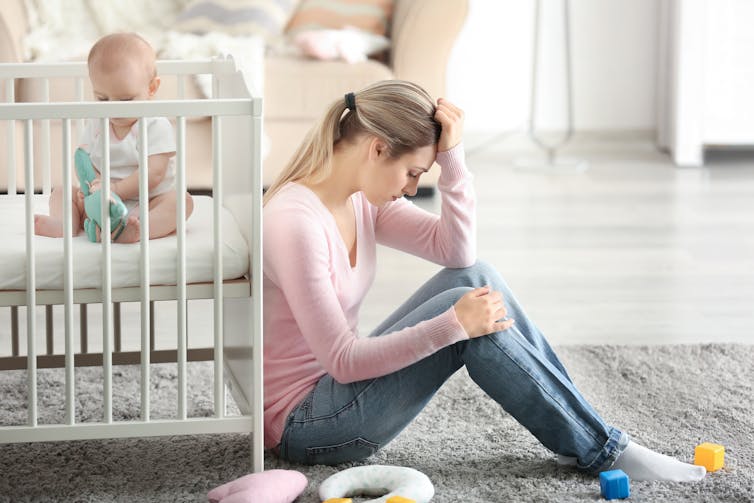Becoming a mother, especially for the first time, has its challenges – and it starts with giving birth.
From woman to woman, the birth experience can vary tremendously – and one of the most important factors that determines the experiences new mothers have is the delivery method. In the UK about 16% of mothers have a an emergency caesarean section, which is performed when the life of the baby or the mother is at risk.
Research has shown the impact this procedure has on mothers’ bodies – including risk of infections, persistent wound and abdominal discomfort – but less is known about the possible consequences for their mental health.
My study analyses the effect of having an unplanned caesarean on new mothers’s psychological well-being. We used a representative sample of 5,000 new mothers living in the UK. It found that giving birth through an emergency caesarean increases the risk of developing postnatal depression in the first nine months after childbirth by about 15%.
Increasing risk
The number of women giving birth by caesarean section has risen over the years. In England, for example, for every 100 new babies, 26 are born through a caesarean section. Compare this with the 1990s, when only 12-15% of deliveries were cesareans (emergency and elective).
According to NHS estimates, in 2013-2014 about 42,000 first time mothers delivered their baby through this procedure – and most of these were emergency deliveries (31,500). Similar phenomenons have also been observed in other countries.
Long-term impact
Postnatal depression can have a profound and long-term impact on the lives of new mothers. It can lead to a deterioration of their relationship with their partner and limit their ability to work.
Postnatal depression can also become a chronic condition affecting the way mothers look after their children. Indeed, previous studies have found lower immunisation rates and higher hospital admissions among children of depressed mothers.

Mothers giving birth through an emergency caesarean are different from mothers who give birth naturally in many ways. For example, older or overweight women are more likely to have an emergency caesarean. Complications during labour due to the baby’s health may result in an emergency caesarean. And this can also have an effect on the mother’s psychological well-being, as she may worry for her baby’s health.
In the study, it was important to account for these differences, because what we were interested in was whether emergency caesareans increases the risk of postpartum depression – rather than the effect of these existing factors.
More support
We considered all these factors and concluded that women giving birth through an emergency caesarean were 15% more likely to develop postnatal depression. This is a large percentage, when you consider that about one in every three mothers experience some form of postnatal depression after childbirth.
Exactly why this happens, is still unknown. But previous studies have argued that longer and more difficult postpartum recovery for mothers who had a caesarean delivery, as well as the separation of mothers from their babies directly after the delivery may cause this phenomenon. Another explanation is that because emergency caesareans are unexpected events, they may be associated with loss of control and with a birth experience that is very different from what was expected.
Of course, in many cases, emergency deliveries cannot be avoided. But the results of this research highlight the importance of providing additional psychological support to women who have an emergency caesarean. This is important, because supporting mothers who give birth through an emergency caesarean may not only help to reduce the risk of postnatal depression and improve their well-being, but it could also benefit their families, and in particular their children.![]()
Valentina Tonei, Research Associate in the Department of Economics, University of York
This article is republished from The Conversation under a Creative Commons license. Read the original article.